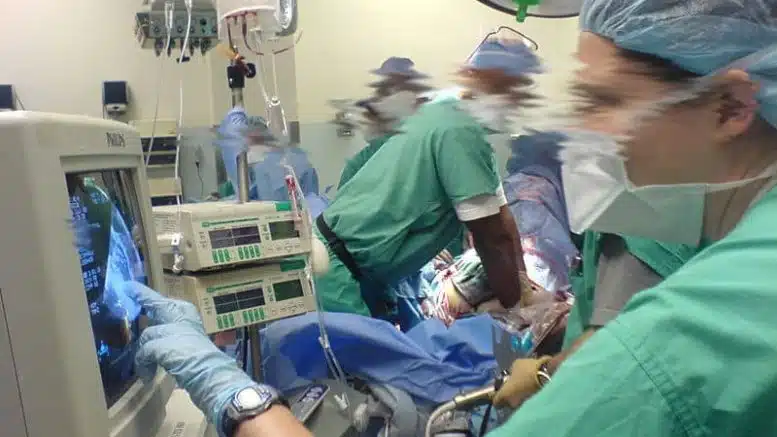By Michelle Crouch
For years, Katie and her husband have used traditional forms of birth control to prevent pregnancy. The 28-year-old knew that if it failed, she could always get an abortion.
The Concord woman explained that she has never wanted children. She also takes medication that could cause complications if she were to get pregnant.
When the U.S. Supreme Court overturned Roe v. Wade last summer, Katie –who declined to share her last name to protect her privacy – began to think she needed more protection. Then, this spring, North Carolina lawmakers approved a 12-week restriction on abortions, and that confirmed Katie’s decision.
She had her fallopian tubes removed last week by a Charlotte doctor.
“People may say, ‘What if you regret it?’ But I think it’s a far greater risk to have children and regret having them,” Katie said. “I would never want to bring someone into the world and then resent them.”
Katie is among a growing number of women in North Carolina choosing permanent sterilization in the wake of new abortion restrictions, four doctors told The Ledger/NC Health News.
The doctors noted that a large number of patients, like Katie, are younger than 30 and child-free.
“In the past year, I’ve had at least 50 percent more consultations than I did before,” said Jennie Hauschka, a gynecologist at Tryon Women’s Center in Charlotte, a division of Tryon Medical Partners. “Abortion is referenced as an aside. They’ll say, ‘If something were to happen, I don’t have that to fall back on anymore.’”
Sterilizations doubled at one UNC Health practice
Amy Bryant, an obstetrician-gynecologist at UNC Health, said the number of sterilization procedures performed by her OB-GYN group has doubled during the past year.
While many patients are young people who don’t want children, other patients are spurred by the fear that lawmakers will impose more restrictions on contraception, or that they won’t be able to have a say in what happens to them, Bryant said.
“The fear is real,” Bryant said. “Patients are expressing the need to exercise autonomy over their own bodies.”
Even before the abortion restrictions, a growing number of U.S. adults were choosing not to have children. A 2019 report by the Pew Research Center found that some 44 percent of adults age 18 to 49 said it’s “not too likely” or “not at all likely” that they’ll have kids one day, a 7 percentage point increase from 2018.
Kavita Arora, division director for general obstetrics, gynecology and midwifery at the UNC School of Medicine, said patients have told her they “feel like they no longer have wiggle room, that the margin of error is gone.”
“I do worry that patients are being pushed into a permanent surgery they would not otherwise be considering outside of state law,” Arora said.
Atrium Health declined to let its doctors be interviewed for this story even though three physicians said they were willing to talk to our reporter. “We are not doing interviews right now because it’s too early to know the effects of the law,” a spokeswoman wrote in an email.
A Novant Health spokeswoman said the doctors she contacted haven’t seen an increase in requests for sterilization.
The Ledger/NC Health News talked to one doctor who said she hadn’t seen an increase. She also said her practice consists largely of older patients.
Not just in North Carolina
Concrete statistics are hard to come by, but the doctors interviewed by The Ledger/NC Health News said they talk frequently with other North Carolina OB-GYNs, and they believe sterilizations are up across the state.
Doctors across the country have seen a similar trend since the Supreme Court decision, according to reporting by national media outlets.
The week after the ruling, web searches for terms such as “tubal ligation” and “tubes tied” tripled, both in North Carolina and nationwide, according to Google data.
There has also been a spike of interest on social media. For instance, over the past year, a Facebook group called “Childfree and sterile/seeking sterilization” has grown from 4,700 members to more than 7,400, a moderator told The Ledger/NC Health News.
“Put an IUD in my daughter”
In addition to sterilization, some doctors say the abortion changes have prompted more patients to consider long-acting forms of contraception like IUDs, which have to be inserted by a health care provider. They are less likely to fail than other types of birth control.
Alyse Kelly-Jones, a gynecologist at Tryon Women’s Center in Charlotte, said she has seen a “definite uptick” in the number of women requesting IUDs, with some patients specifically referencing the current political climate. Others are trying to protect their children.
“I’ve had some moms bringing in their teenage daughters who aren’t even ready for contraception saying, ‘Put an IUD in my daughter,’” Kelly-Jones said.
Men also getting snipped
Men apparently are also taking additional steps to protect against unplanned pregnancies. Like urologists nationwide, Manish Damani of Urology Specialists of The Carolinas in Charlotte said requests for vasectomies have surged.
Damani has also seen a dramatic shift in his patient demographics over the past year.
“Before, I would see mostly men 30 and above who wanted vasectomies,” he said. “Now, about half are aged 18 to 25 and have no children. It’s amazing what we’re seeing now. I’ve literally had a lot of them come in with their parents.”
Damani said many men ask if they can do a reversal down the road. He tells them there’s no guarantee, but that his reversal success rate is 82 to 99 percent, depending largely on how long it’s been since the patient’s vasectomy.
When women choose to get sterilized, however, reversal is rarely an option.
The standard female sterilization procedure is called a salpingectomy, which is the removal of the fallopian tubes that connect ovaries to the uterus. The procedure has a lower chance of failure compared to a traditional tubal ligation (getting your “tubes tied”) and reduces ovarian cancer risk. But it can’t be reversed.
Some doctors turn down young people
Because it’s permanent, some doctors are reluctant to do salpingectomies in patients under a certain age. Hauschka and Bryant both said they’ve had patients who have been to other doctors who wouldn’t do the procedure.
Sign up for our Newsletter
“*” indicates required fields
Some physicians worry that young people may jump on the “child-free” bandwagon without taking into account how much their lives could change in the coming decades.
One 1999 study found patients sterilized before age 30 were more than three times as likely to have regret than patients older than 30. However, women under 30 who never had children and chose sterilization had significantly lower rates of regret than those who had had children already before undergoing sterilization, the study showed.
Doctors who do the sterilizations said they have to walk a fine line. They want to ensure that their patients understand the risks and consequences of their decision, including the risk of regret, while still allowing patients to have autonomy over their bodies.
Armed with a “sterilization binder”
Katie said she brought a “sterilization binder” to her first appointment to talk about the procedure. It was an idea recommended by a social media group for child-free young people pursuing sterilization.
Katie’s binder included a statement of consent, her views on pregnancy and parenthood, a release of liability and her answers to questions the doctor might ask. “I had about 20 pages that said, ‘I understand the risk, I understand I might change my mind, I understand this is permanent and I won’t hold you liable,’” Katie said.
Katie said her doctor said she didn’t need to look at the binder after talking with Katie, and the surgery happened last Thursday. On Friday, Katie said the procedure went smoothly and she was recovering at home.
“I’m happy it all went well, and having it over is such a relief,” she said. “This is me protecting myself, and I don’t have to worry about pregnancy anymore.”










